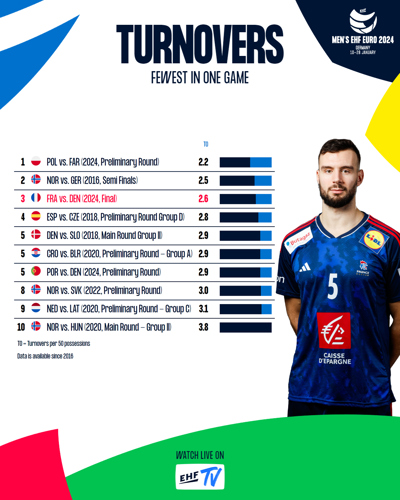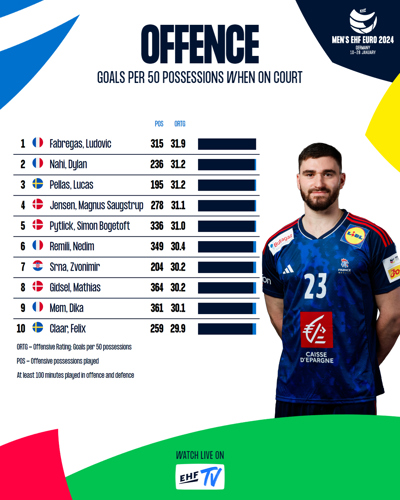By the numbers, Denmark were the big favourites going into Sunday’s EHF EURO final against France. They had the best offence and, after Germany, the best defence – both by raw and opponent adjusted goals scored and conceded per 50 possessions.
Even after losing the final, Denmark clearly rank above France. By raw goals scored and conceded per 50 possessions, they remain first and second with 31.1 and 25.6. Adjusted for the strength of their opponents, however, they still rank first if only main round teams are considered; or second, if Spain, who didn’t make it to the main round and had horrible defensive numbers, are included with 31.1. Defensively, with 25.1 conceded, they are in third place among the main round teams.
France rank second – and third if Spain are included – in both raw and opponent adjusted goals scored per 50 possessions with 30.9 and 30.7. Defensively they had problems during the tournament. They ranked only 10th among main round teams (14th overall) with 27.5 goals conceded per 50 possessions. Adjusted to their opponents, that number remains the same, but they slightly improve to rank nine (11 overall).
Adjusting for possessions played is significantly more meaningful than just the raw number of goals (conceded) because it makes teams comparable since the raw number of goals is not only influenced by efficiency but also by the number of possessions – whether a team and their opponents play rather fast or slow.
Additionally, because in tournaments such as the EHF EURO teams can play opponents of different strengths, these numbers can be adjusted for opponent strength – and excluding so-called garbage time – as well. (More on how this is done in the previous Stats Counter.)
Turnovers made the difference
But of course, all of that doesn’t matter in the end as France won 33:31 against the Scandinavians. They even came relatively close to their usual statistics scoring 28.9 goals per 50 possessions and conceding 27.2 in the final. As well as probably possible, they had the Danish backcourt stars under control.
Although Nikolaj Jacobsen’s team shot better from the field and from penalties, ‘Les Bleus’ had one big advantage: they just didn’t turn the ball over. Adjusted to 50 possessions, they lost the ball just 2.6 times. That’s the third lowest in all games at the last five EHF EUROs. Denmark had significantly more with 9.6.
For the whole tournament that was one of the few weaknesses Denmark’s defence had. Among the main round teams, they forced the fewest turnovers with 9.6 per 50 possessions, while France, in contrast, themselves had the fewest turnovers of EHF EURO 2024 with 6.9. But the 2.6 in the final was an unforeseeable outlier.

Similar to the shooting percentage, the goalkeeper performance in the final was also clearly better by the Danes. They saved 35.3% of the attempts on their goal, compared to only 22.5% for the new European champions. But still, France’s new No. 1 Samir Bellahcene was there when the game was on the line.
With 66.4% over the whole tournament Denmark had the best shooting percentage from the field. Bellahcene knew this of course as well. After the game he revealed that his mindset going into the game wasn’t to make 20 saves as this is probably impossible against Denmark’s outstanding offence. But even though he had his second worst game of the tournament in terms of save percentage (23.7%), he said he was able to stay focused and saw his save against Mikkel Hansen in extra time as a turning point to win the game.
Not only in this game, but overall, France’s goalkeepers were not their big strength. Together, they saved just 28.3% which was around average. But Bellahcene is one of the big winners of the tournament. At the opening game, he was left out of the gameday roster while at the final, he played the whole game. At the end, Bellahcene was clearly the best of them with 30.6% saves, while Remi Desbonnet had 26.0% and Charles Bolzinger 23.7%.
The MVP that makes his teammates better
While 3.8 goals per game with a shooting efficiency of 54.8% don’t seem too impressive, the EHF EURO MVP Nadim Remili shined by making his teammates better: 6.3 assists per game were attributed to him (six in the final), the third highest of the competition if we exclude teams that didn’t make it to the main round.
After Dika Mem, Remili played the second most minutes in offence and the fifth most in defence for the new European champions. He was also much more important for France’s attack than for their defence. When he was on the court, France scored 30.4 goals per 50 possessions, sixth best among players that played at least 100 minutes in attack and defence, and second best among back court players – after Simon Pytlick from final opponents Denmark. The difference between goals scored and conceded per 50 possessions when Remili was on the court is the ninth best among back court players with +2.9.

These statistics should of course be treated with caution as the numbers are not only influenced by the players themselves, but also by their teammates and opponents on the court with them. (More on the background of these statistics in the preview article of EHF EURO 2024.) But they indicate that Remili is extremely important to France’s offence, while in defence Guillaume Gille could maybe give him a bit more rest to allow him to be even better in offence.
However, as defence also influences offence, it allows them to play the fast style of handball with the third shortest possessions of the tournament. In the end, they won the title, so there is hardly a reason to change anything anyway.
More from data analyst Julian Rux can be found at Handballytics.de. There you can read his latest articles, in which he analyses all kinds of handball topics from new, data-based perspectives. You can also find him on Instagram, Facebook, X (Twitter) and WhatsApp Channels.
photo © 2024 Anze Malovrh / kolektiff








